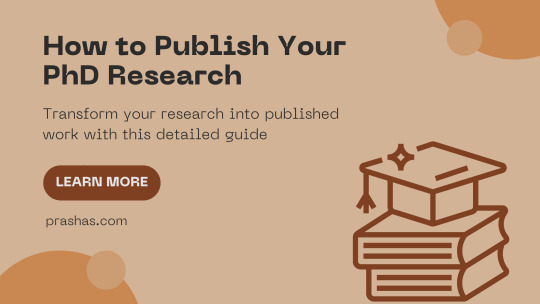#PhDGuide
Explore tagged Tumblr posts
Text
The Ultimate Guide to Successfully Publishing Your PhD Research
Publishing your PhD research is a key milestone in your academic career. It turns years of hard work into key contributions to your field. This, in turn, increases the importance of your scholarly contributions. Yet, it can be overwhelming. The process has many phases, from paper prep to negotiating peer review. This tutorial simplifies the process. It gives techniques for successfully publishing your study.

Why Publish Your PhD Research?
Publishing isn't about adding lines to your CV. it has broader implications.
The Advancing Knowledge: Your research enhances the academic discourse in your field.
The Establishing Credibility: Published work establishes you as a credible and recognized researcher.
Career Growth: Publications are often prerequisites for academic and research positions.
Networking: It opens doors for collaboration and discussions within your field.
Step-by-Step Guide to Publishing Your PhD Research
1. Understand the publication process
Before diving in, familiarize yourself with how academic publishing works. This includes:
Types of Publications: Full research articles, review papers, and short communications.
Timeline: The process, from submission to publication, can take months to years.
Key Players: Editors, reviewers, and journal staff guide the process.
2. Choose the Right Journal
Your choice of journal impacts the visibility and reach of your research. Consider:
The audience and scope: Ensure the journal aligns with your research areas.
The Impact Factor: While not the sole indicator, it reflects the journal's influence.
Open Access vs. Subscription: Open-access journals reach more people. But, they may charge fees to process articles.
Pro Tip: Use tools like Journal Finder or Think. Check. Submit. to identify suitable journals.
3. Be Prepare Your Manuscript
Follow the guidelines: Adhere strictly to the journal's submission guidelines.
Clear Writing: Make your research accessible without losing technical depth.
Effectively structure: Typically, employ IMRaD (Introduction, Methods, Results, and Discussion).
"Cite Responsibly: Use proper referencing styles and avoid self-plagiarism."
4. Seek feedback before submission.
Share your draft with peers or mentors for constructive feedback.
Utilize editing services or writing workshops to refine your manuscript.

5. Submit Your Research Manuscript
Include a powerful cover letter that emphasizes the importance of your job.
Upload your manuscript and supplemental files through the journal's online submission system.
6. Reaction to Peer Reviews
Be patient: Peer review can be lengthy, but it is essential for quality assurance.
Address Reviewer Comments: Be thorough and polite in your responses, providing detailed revisions.
Prepare for Rejections: If reviewers reject your paper, improve it using their feedback. Then, consider resubmitting it elsewhere.
7. Post-Publication Steps
Promote Your Research: Share your work on networks like ResearchGate and LinkedIn.
The Track Metrics: Track citations and downloads to understand your paper’s impact.
Engage with the community: Present your findings at conferences and workshops.

Overcoming Common Challenges
1. Time Constraints
Balancing publication with other responsibilities is tough. Create a timeline and dedicate specific hours each week to writing and revisions.
2. Fear of Rejection
Rejections are part of the process. Treat them as learning opportunities to strengthen your research.
3. Navigating Ethical Concerns
"Follow ethical guidelines. Avoid plagiarism and secure informed consent for studies involving human participants."
FAQs
1. How long will it take for the publication process?
It varies by journal and its peer-review process. Generally, it takes 3–12 months from submission to publication.
2. Can I publish negative results?
Yes! Negative results aid science. They can help others avoid the same mistakes.
3. How many papers should i need to publish during my PhD?
This depends on your discipline and program requirements. On average, 2–5 papers are a reasonable goal.
4. Do I need to pay the amount to publish my research?
Some journals charge fees for open access, while others do not. Always verify fee structures before submission.
5. What if my research is rejected?
Revise based on feedback and submit to another journal. Rejection is not the end of the research!
Conclusion
Publishing your PhD research is rewarding but tough. Know the publication process, choose the right journal, and persevere. Then, you can share your work with the world. Remember, every published paper is a step forward for your career and your field. Keep learning, improving, and contributing!
#PhD#ResearchPublishing#AcademicSuccess#PhDResearch#PublishYourResearch#DoctoralStudies#PhDLife#GradSchool#AcademicWriting#ThesisWriting#PhDStudents#ResearchJourney#PublicationTips#Doctorate#GradStudentLife#ResearchTips#PublishingJourney#HigherEducation#PhDCommunity#AcademicExcellence#ResearchScholar#ResearchGoals#ScientificPublishing#DoctoralResearch#PhDAdvisor#PhDGuide
2 notes
·
View notes
Text
Your Doctoral Success Starts Here! At PhD Help, our specialists bring a wealth of expertise to guide you towards an innovative approach to your doctoral research and writing tasks. Trust us to transform your research aspirations into reality.
For more info: http://phdhelp.co/ +91 9944776629 [email protected]

#phdassistance#phdresearch#phdguidance#bestphdassistanceinindia#phdscholars#phdservice#researchpaperswriting#researchproposalwritingservices#journalpublication#thesiswriting#phdguides#phdhelp
0 notes
Text
Why Business Management Dissertation help from PhD Assistance?
About PhD Assistance
Phd Assistance is world’s established academic guidance provider and has guided more than 4500 Phd scholars and 10500 Masters students across the world. Students, entrepreneurs, and research scholars gain from our expertise. We concentrate on delivered technically strong output, keeping in mind on-time delivery. Both text and data are our expertise and we offer cutting edge research consulting and writing services to meet your academic project requirement or business information.
Why Business Management Dissertation help from PhD Assistance?

PhD Assistance builds the entire dissertation starting from the introduction to recommendations. We know the difficulty in developing a research proposal. We help you in identifying the topic, evaluating the literature, developing the problem statement, research question and research hypotheses. The research design, statistical analysis, discussion, results, recommendations and conclusions are taken care by us.
When you entrust your dissertation needs to PhD Assistance you get innovative and distinct dissertation as per the recent trends.
Contact Via [email protected]
visit :www.phdassistance.com
Call : +91 8754446690
0 notes
Text
How to Choose the Right PhD Supervisor: Key Tips for Success
Your PhD supervisor plays a crucial role in your academic journey. Learn how to select a mentor who aligns with your research goals and supports your success. #PhDLife #AcademicJourney #ResearchTips
#PhDJourney#AcademicLife#ChooseWisely#PhDAdvice#ResearchMentor#GradSchoolTips#SupervisorGoals#AcademicSuccess#PhDPlanning#GradLifeHacks#FutureScholar#PhDGuide#ResearchSuccess#AcademicMentorship#PhDLife
0 notes
Text

Your Doctoral Success Starts Here! At PhD Help, our specialists bring a wealth of expertise to guide you towards an innovative approach to your doctoral research and writing tasks. Trust us to transform your research aspirations into reality.
For more info: http://phdhelp.co/ +91 9944776629 [email protected]
#phdassistance#phdresearch#phdguidance#bestphdassistanceinindia#phdscholars#phdservice#researchpaperswriting#researchproposalwritingservices#journalpublication#thesiswriting#phdguides#phdhelp
0 notes
Text
PhD Help| PhD Thesis Writing | PhD Assistance
Your Doctoral Success Starts Here! At PhD Help, our specialists bring a wealth of expertise to guide you towards an innovative approach to your doctoral research and writing tasks. Trust us to transform your research aspirations into reality.
For more info: http://phdhelp.co/ +91 9944776629 [email protected]

#phdassistance#phdresearch#phdguidance#bestphdassistanceinindia#phdscholars#phdservice#researchpaperswriting#researchproposalwritingservices#journalpublication#thesiswriting#phdguides#phdhelp
0 notes